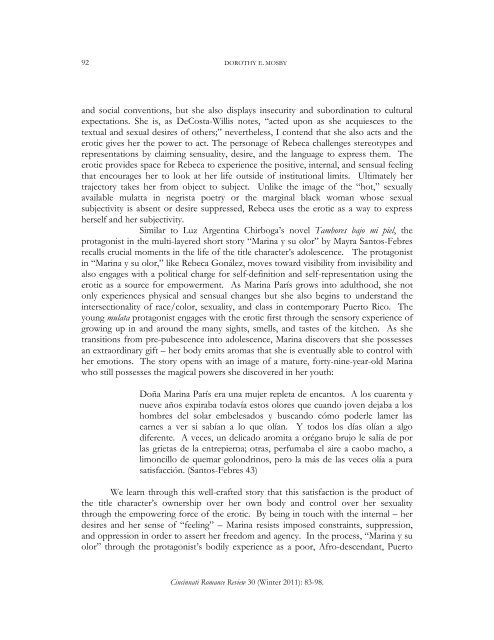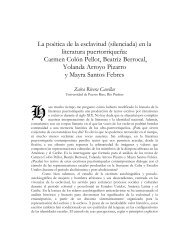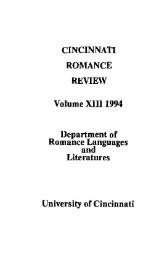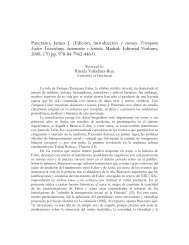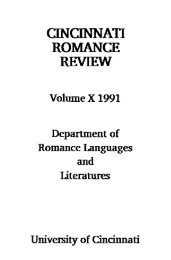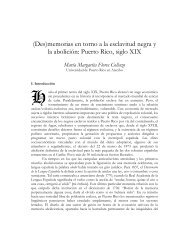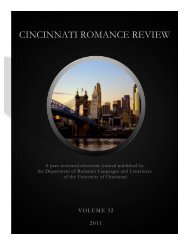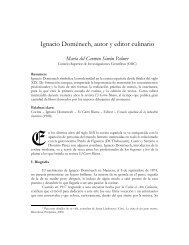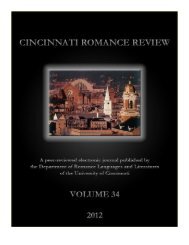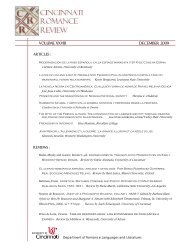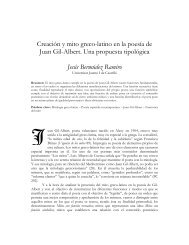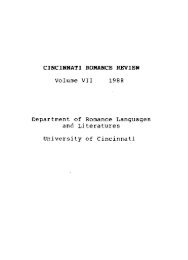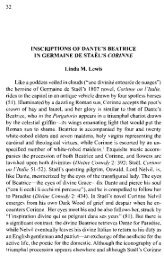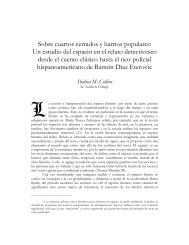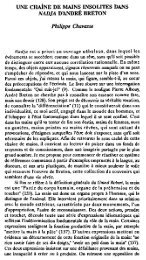Volume 30 (2011) - Cincinnati Romance Review
Volume 30 (2011) - Cincinnati Romance Review
Volume 30 (2011) - Cincinnati Romance Review
Create successful ePaper yourself
Turn your PDF publications into a flip-book with our unique Google optimized e-Paper software.
92 DOROTHY E. MOSBY<br />
and social conventions, but she also displays insecurity and subordination to cultural<br />
expectations. She is, as DeCosta-Willis notes, “acted upon as she acquiesces to the<br />
textual and sexual desires of others;” nevertheless, I contend that she also acts and the<br />
erotic gives her the power to act. The personage of Rebeca challenges stereotypes and<br />
representations by claiming sensuality, desire, and the language to express them. The<br />
erotic provides space for Rebeca to experience the positive, internal, and sensual feeling<br />
that encourages her to look at her life outside of institutional limits. Ultimately her<br />
trajectory takes her from object to subject. Unlike the image of the “hot,” sexually<br />
available mulatta in negrista poetry or the marginal black woman whose sexual<br />
subjectivity is absent or desire suppressed, Rebeca uses the erotic as a way to express<br />
herself and her subjectivity.<br />
Similar to Luz Argentina Chirboga’s novel Tambores bajo mi piel, the<br />
protagonist in the multi-layered short story “Marina y su olor” by Mayra Santos-Febres<br />
recalls crucial moments in the life of the title character’s adolescence. The protagonist<br />
in “Marina y su olor,” like Rebeca Gonález, moves toward visibility from invisibility and<br />
also engages with a political charge for self-definition and self-representation using the<br />
erotic as a source for empowerment. As Marina París grows into adulthood, she not<br />
only experiences physical and sensual changes but she also begins to understand the<br />
intersectionality of race/color, sexuality, and class in contemporary Puerto Rico. The<br />
young mulata protagonist engages with the erotic first through the sensory experience of<br />
growing up in and around the many sights, smells, and tastes of the kitchen. As she<br />
transitions from pre-pubescence into adolescence, Marina discovers that she possesses<br />
an extraordinary gift – her body emits aromas that she is eventually able to control with<br />
her emotions. The story opens with an image of a mature, forty-nine-year-old Marina<br />
who still possesses the magical powers she discovered in her youth:<br />
Doña Marina París era una mujer repleta de encantos. A los cuarenta y<br />
nueve años expiraba todavía estos olores que cuando joven dejaba a los<br />
hombres del solar embelesados y buscando cómo poderle lamer las<br />
carnes a ver si sabían a lo que olían. Y todos los días olían a algo<br />
diferente. A veces, un delicado aromita a orégano brujo le salía de por<br />
las grietas de la entrepierna; otras, perfumaba el aire a caobo macho, a<br />
limoncillo de quemar golondrinos, pero la más de las veces olía a pura<br />
satisfacción. (Santos-Febres 43)<br />
We learn through this well-crafted story that this satisfaction is the product of<br />
the title character’s ownership over her own body and control over her sexuality<br />
through the empowering force of the erotic. By being in touch with the internal – her<br />
desires and her sense of “feeling” – Marina resists imposed constraints, suppression,<br />
and oppression in order to assert her freedom and agency. In the process, “Marina y su<br />
olor” through the protagonist’s bodily experience as a poor, Afro-descendant, Puerto<br />
<strong>Cincinnati</strong> <strong>Romance</strong> <strong>Review</strong> <strong>30</strong> (Winter <strong>2011</strong>): 83-98.


